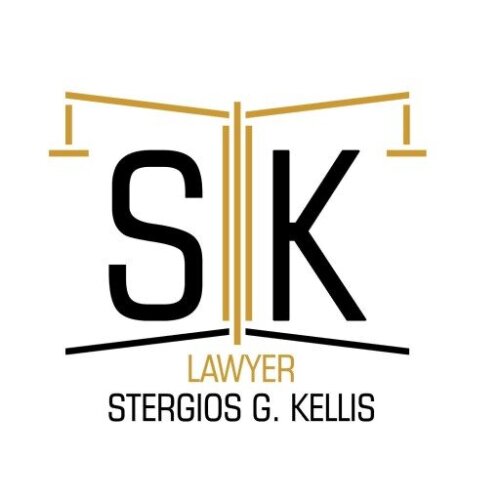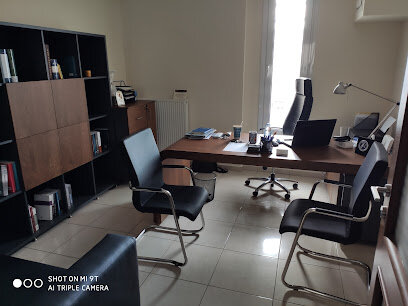Best Drunk Driving Lawyers in Xanthi
Share your needs with us, get contacted by law firms.
Free. Takes 2 min.
List of the best lawyers in Xanthi, Greece
About Drunk Driving Law in Xanthi, Greece
Drunk driving in Xanthi is governed by national Greek road and criminal laws that apply uniformly across the country. Police routinely conduct roadside checks using breathalyzers and can order a blood test when required. Driving under the influence can lead to administrative penalties such as fines and driving disqualification, and in more serious cases criminal prosecution, which can carry imprisonment. Penalties depend on the measured blood alcohol concentration, whether the driver is a novice or professional, the presence of aggravating factors such as accidents, injury or death, and whether the driver refuses testing.
Why You May Need a Lawyer
Many situations related to drunk driving benefit from legal advice. A lawyer can help if you face police questioning, a breath or blood test result you dispute, administrative fines or license suspension, criminal charges after an accident or after causing injury or death, or complications from refusing a test. Lawyers can advise on procedural rights during police stops, represent you in court or administrative hearings, negotiate plea agreements where appropriate, and help preserve evidence that may be important to your defense. If you are a foreign national, an experienced local lawyer can also assist with consular contact and translation issues.
Local Laws Overview
Greece sets legal limits and procedures for driving under the influence, and Xanthi follows those national rules. Key aspects to keep in mind include:
- Legal limits and categories: Greece uses blood alcohol concentration limits with stricter thresholds for novice drivers and professional drivers. Higher measured levels typically result in more severe sanctions.
- Roadside testing and evidence: Police may perform a breathalyzer test at the scene and may require a medical or forensic blood test. Police records and official test results are central pieces of evidence in proceedings.
- Administrative and criminal consequences: Administrative measures can include fines, immediate license suspension, and vehicle immobilization. Criminal prosecution is possible where the incident involves high intoxication levels, accidents, injury, or death.
- Refusal to test: Refusing to submit to breath or blood testing can itself trigger penalties and is likely to complicate your legal position. Legal counsel can explain the risks and procedural options in these circumstances.
- Court process and rights: If criminal charges are brought, defendants have the right to counsel, to present evidence, and to appeal. There are specific procedural timelines and formalities to observe.
Frequently Asked Questions
What should I do if a police officer stops me and asks me to take a breathalyzer?
Remain calm and comply with lawful instructions. You should identify yourself and follow directions. If you are asked to take a breathalyzer or to accompany officers for a blood test, comply where required - refusal can lead to additional penalties. Politely say you wish to speak with a lawyer before answering any non-routine questions. Note any irregularities in how the test was conducted and tell your lawyer about them.
Can I refuse a breath or blood test?
Refusing a breath or blood test is generally not advised. Refusal can carry its own penalties and may be used against you in administrative or criminal proceedings. If you believe the request is unlawful, do not resist physically - document the situation and consult a lawyer as soon as possible.
What penalties could I face for drunk driving in Xanthi?
Penalties vary by level of intoxication and circumstances. Possible consequences include fines, administrative license suspension, vehicle immobilization, criminal charges, and in serious cases imprisonment if the offense caused injury or death. Repeat offenses and professional drivers face harsher penalties. A lawyer can explain the likely range of sanctions based on your case specifics.
Will I automatically lose my driving license?
Not always automatically, but administrative suspension is common after a DUI incident, especially with elevated test results. The length of suspension depends on the measured alcohol level and whether there are aggravating factors. You will usually receive formal notification of any suspension and information on how to challenge it in the appropriate authority or court.
What if I was involved in an accident while driving under the influence?
Accidents increase the seriousness of the matter. If someone was injured or killed, you may face criminal charges, civil liability for damages, and more severe administrative penalties. It is important to secure legal representation immediately, preserve evidence such as witness statements and photographs, and refrain from making detailed admissions to police without a lawyer present.
Can test results be challenged?
Yes. Breath and blood test results can sometimes be challenged on technical or procedural grounds - for example, improper calibration of equipment, chain of custody errors for blood samples, or failure to follow required procedures. A lawyer can arrange for independent review of the testing process and advise whether a challenge is viable.
How long do I have to contest a fine or suspension?
There are strict deadlines for contesting administrative measures and for filing appeals in criminal and civil matters. Deadlines depend on the type of measure and the issuing authority. Consult a lawyer quickly to ensure you meet procedural timelines and preserve your right to appeal.
I am a foreign visitor - how does a DUI affect me?
Foreign visitors face the same legal process as residents and may also have to deal with travel, immigration, and consular issues. Criminal convictions can affect visa applications and travel. Contact your embassy or consulate for assistance and obtain local legal representation to handle proceedings in Greece.
What evidence should I collect after a DUI stop or accident?
Collect whatever you can safely and legally: the police report number and officer identification, witness names and contact details, photos of the scene, vehicle damage and injuries, any medical records or test results you receive, and receipts or logs that show your movements if relevant. Do not interfere with police evidence gathering. Provide copies to your lawyer as soon as possible.
Can a lawyer get my charges reduced or dismissed?
A lawyer can evaluate the facts, challenge procedural or evidentiary issues, negotiate with prosecutors, and advocate for reduced charges or alternative resolutions such as plea agreements or diversion programs where appropriate. Outcomes depend on the strength of the prosecution's case, the presence of aggravating or mitigating factors, and applicable law. Legal representation improves the chance of a favorable result.
Additional Resources
For people seeking practical help or official information, the following types of organizations and bodies can be useful to contact within Greece and locally in Xanthi:
- Local police station in Xanthi for official incident reports and procedural guidance.
- Hellenic Police traffic division, which administers roadside testing and issues administrative decisions.
- Ministry of Infrastructure and Transport for national road-safety rules and licensing information.
- Local Bar Association or the Xanthi Bar for referrals to qualified criminal and traffic lawyers.
- Your embassy or consulate if you are a foreign national, for consular support and translation help.
- Treatment and support organizations for alcohol dependence and rehabilitation programs if substance misuse is a concern.
Next Steps
If you are facing a drunk driving matter in Xanthi, consider these immediate actions:
- Get legal help promptly. Contact a lawyer with experience in traffic and criminal law in Greece, and ideally someone familiar with Xanthi procedures.
- Preserve documentation. Keep police reports, medical records, test receipts and any correspondence. Note timelines given in notices.
- Avoid detailed statements without counsel. You have the right to legal advice before answering questions that may affect your rights.
- If you are a foreigner, notify your embassy or consulate and ask about local procedures and recommended lawyers.
- Prepare for administrative requirements. You may need to pay fines, attend hearings, or submit documents within strict deadlines to contest a suspension or penalty.
Every case is different. A local lawyer can assess your situation, explain likely outcomes, and represent you at administrative hearings and in court. Early advice improves your ability to protect your rights and to work toward the best possible result.
Lawzana helps you find the best lawyers and law firms in Xanthi through a curated and pre-screened list of qualified legal professionals. Our platform offers rankings and detailed profiles of attorneys and law firms, allowing you to compare based on practice areas, including Drunk Driving, experience, and client feedback.
Each profile includes a description of the firm's areas of practice, client reviews, team members and partners, year of establishment, spoken languages, office locations, contact information, social media presence, and any published articles or resources. Most firms on our platform speak English and are experienced in both local and international legal matters.
Get a quote from top-rated law firms in Xanthi, Greece — quickly, securely, and without unnecessary hassle.
Disclaimer:
The information provided on this page is for general informational purposes only and does not constitute legal advice. While we strive to ensure the accuracy and relevance of the content, legal information may change over time, and interpretations of the law can vary. You should always consult with a qualified legal professional for advice specific to your situation.
We disclaim all liability for actions taken or not taken based on the content of this page. If you believe any information is incorrect or outdated, please contact us, and we will review and update it where appropriate.










